2021-2022学年人教版(2019)必修一:Unit 4:Narual disasters 强化练习(有答案)-
文档属性
| 名称 | 2021-2022学年人教版(2019)必修一:Unit 4:Narual disasters 强化练习(有答案)- | 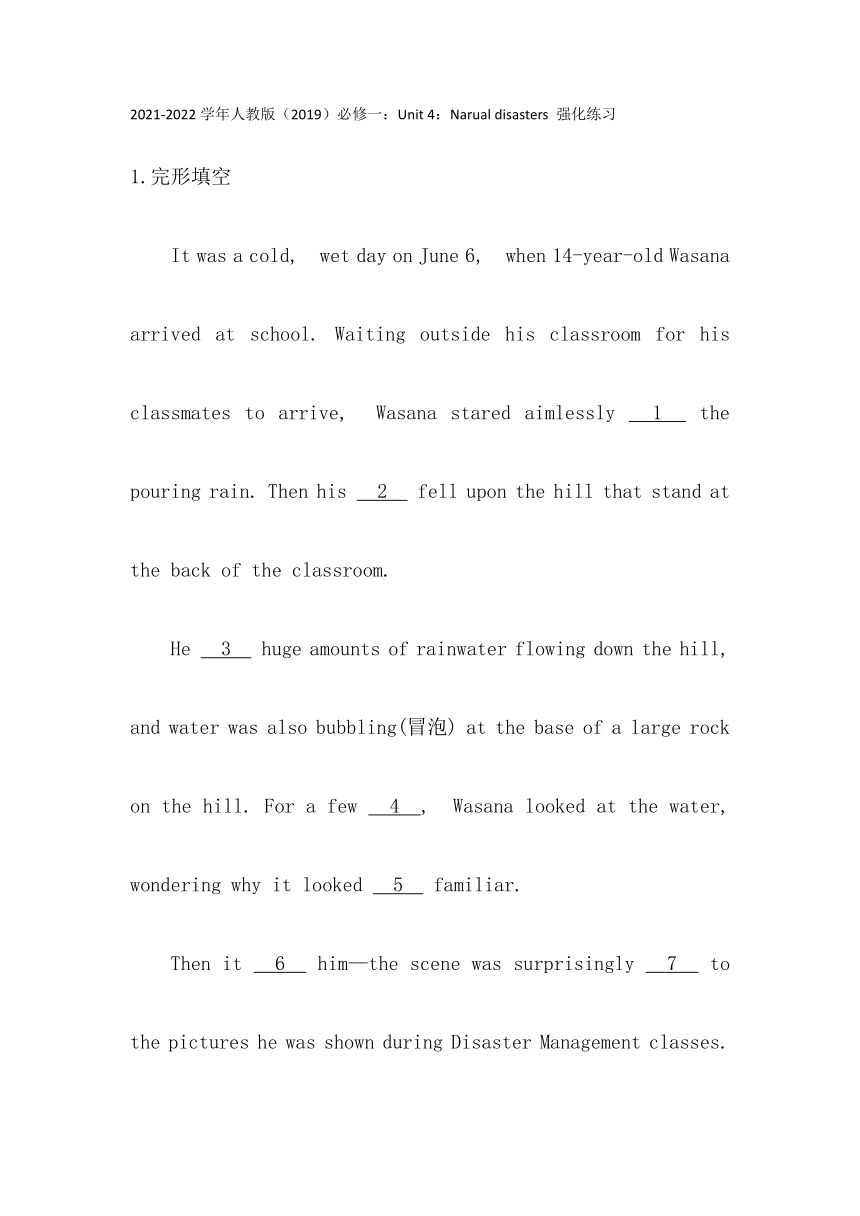 | |
| 格式 | docx | ||
| 文件大小 | 32.0KB | ||
| 资源类型 | 教案 | ||
| 版本资源 | 人教版(2019) | ||
| 科目 | 英语 | ||
| 更新时间 | 2021-09-04 19:22:30 | ||
图片预览

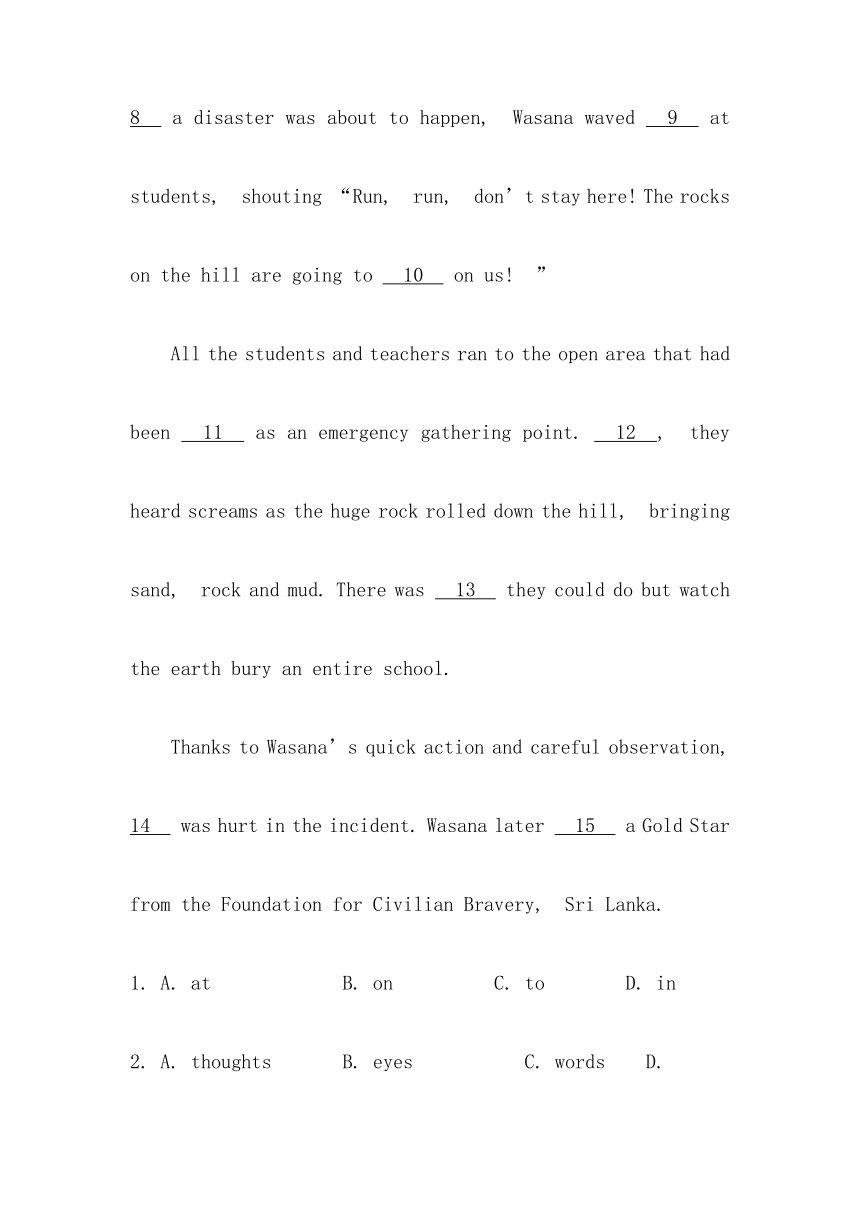
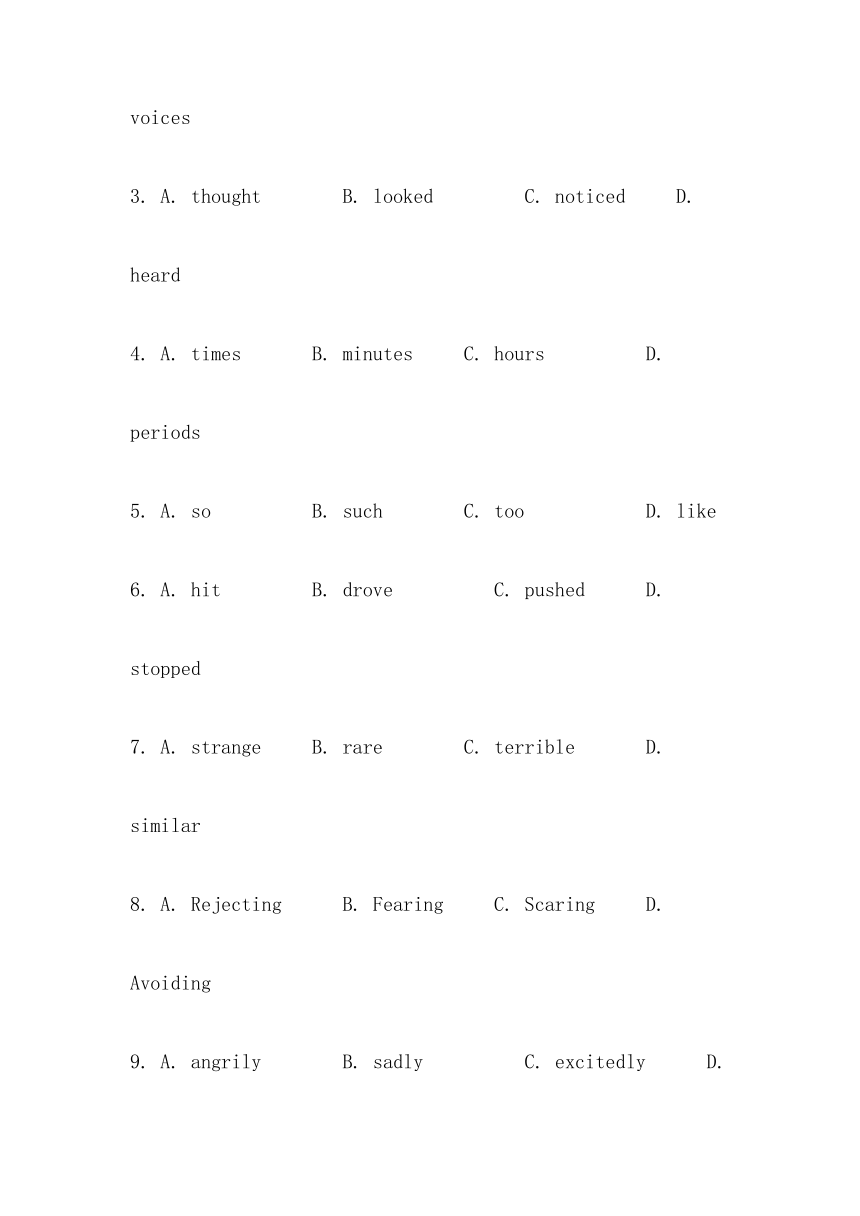
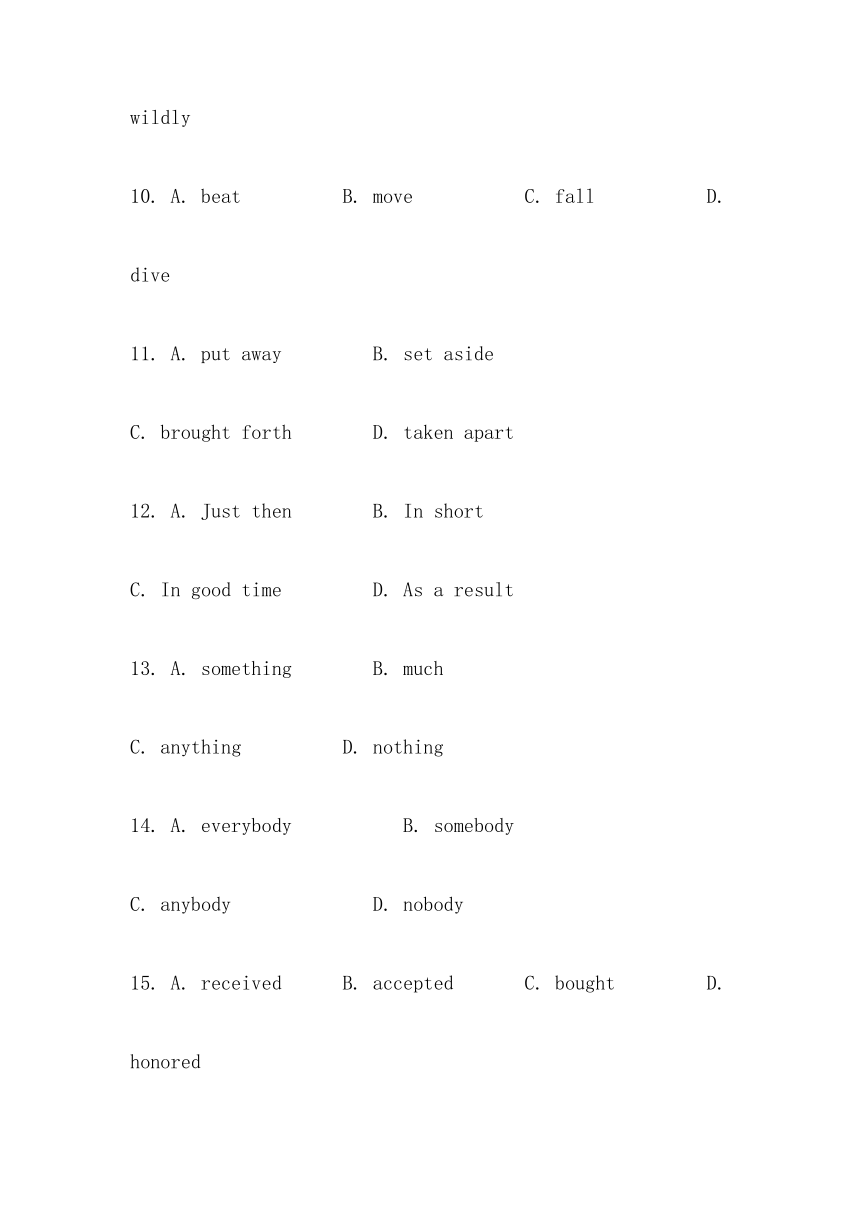
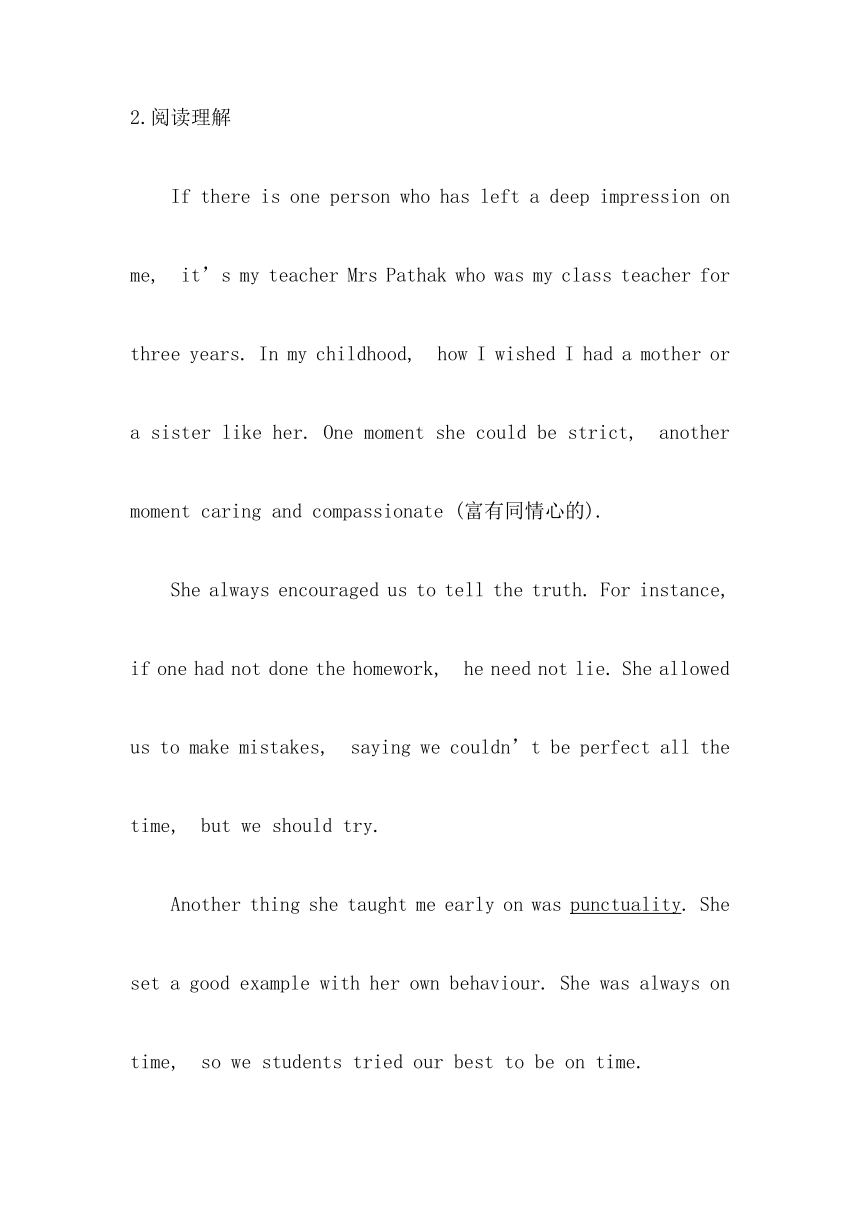
文档简介
2021-2022学年人教版(2019)必修一:Unit
4:Narual
disasters
强化练习
1.完形填空
It
was
a
cold,
wet
day
on
June
6,
when
14-year-old
Wasana
arrived
at
school.
Waiting
outside
his
classroom
for
his
classmates
to
arrive,
Wasana
stared
aimlessly
1
the
pouring
rain.
Then
his
2
fell
upon
the
hill
that
stand
at
the
back
of
the
classroom.
?
He
3
huge
amounts
of
rainwater
flowing
down
the
hill,
and
water
was
also
bubbling(冒泡)
at
the
base
of
a
large
rock
on
the
hill.
For
a
few
4 ,
Wasana
looked
at
the
water,
wondering
why
it
looked
5
familiar.
?
Then
it
6
him—the
scene
was
surprisingly
7
to
the
pictures
he
was
shown
during
Disaster
Management
classes.
8
a
disaster
was
about
to
happen,
Wasana
waved
9
at
students,
shouting
“Run,
run,
don’t
stay
here!
The
rocks
on
the
hill
are
going
to
10
on
us!
”?
All
the
students
and
teachers
ran
to
the
open
area
that
had
been
11
as
an
emergency
gathering
point.
12 ,
they
heard
screams
as
the
huge
rock
rolled
down
the
hill,
bringing
sand,
rock
and
mud.
There
was
13
they
could
do
but
watch
the
earth
bury
an
entire
school.
?
Thanks
to
Wasana’s
quick
action
and
careful
observation,
14
was
hurt
in
the
incident.
Wasana
later
15
a
Gold
Star
from
the
Foundation
for
Civilian
Bravery,
Sri
Lanka.
?
1.
A.
at
B.
on
C.
to D.
in
2.
A.
thoughts
B.
eyes
C.
words
D.
voices
3.
A.
thought
B.
looked
C.
noticed
D.
heard
4.
A.
times
B.
minutes
C.
hours
D.
periods
5.
A.
so
B.
such
C.
too
D.
like
6.
A.
hit
B.
drove
C.
pushed
D.
stopped
7.
A.
strange
B.
rare
C.
terrible
D.
similar
8.
A.
Rejecting
B.
Fearing
C.
Scaring
D.
Avoiding
9.
A.
angrily
B.
sadly
C.
excitedly
D.
wildly
10.
A.
beat
B.
move
C.
fall
D.
dive
11.
A.
put
away
B.
set
aside
C.
brought
forth
D.
taken
apart
12.
A.
Just
then
B.
In
short
C.
In
good
time
D.
As
a
result
13.
A.
something
B.
much
C.
anything
D.
nothing
14.
A.
everybody
B.
somebody
C.
anybody
D.
nobody
15.
A.
received
B.
accepted
C.
bought
D.
honored
2.阅读理解
If
there
is
one
person
who
has
left
a
deep
impression
on
me,
it’s
my
teacher
Mrs
Pathak
who
was
my
class
teacher
for
three
years.
In
my
childhood,
how
I
wished
I
had
a
mother
or
a
sister
like
her.
One
moment
she
could
be
strict,
another
moment
caring
and
compassionate
(富有同情心的).
She
always
encouraged
us
to
tell
the
truth.
For
instance,
if
one
had
not
done
the
homework,
he
need
not
lie.
She
allowed
us
to
make
mistakes,
saying
we
couldn’t
be
perfect
all
the
time,
but
we
should
try.
Another
thing
she
taught
me
early
on
was
punctuality.
She
set
a
good
example
with
her
own
behaviour.
She
was
always
on
time,
so
we
students
tried
our
best
to
be
on
time.
She
surprised
us
with
her
sense
of
humour.
Her
classroom
teaching
was
always
humorous.
After
class,
she
talked
to
us
and
told
us
jokes.
We
really
felt
free
to
ask
questions
and
Mrs
Pathak
would
give
the
answers.
If
she
did
not
know
—
there
had
been
some
occasions—she
would
say
so.
We
all
then
tried
to
find
out
the
answers.
Whoever
came
up
with
the
answer
was
appreciated
and
given
the
due
credit
(应有的称赞).
Now
I
sometimes
wonder
whether
Mrs
Pathak
was
pretending
just
to
encourage
us
to
explore
and
find
answers
by
ourselves.
1.
According
to
the
passage,
which
of
the
following
is
NOT
suitable
for
describing
Mrs
Pathak?
A.
Strict.
B.
Humorous.
C.
Compassionate.
D.
Careful.
2.
The
underlined
word
“punctuality”
in
the
third
paragraph
probably
means
.
A.
being
on
time
B.
being
honest
C.
being
patient
D.
being
clean
3.
In
the
author’s
opinion,
why
didn’t
Mrs
Pathak
give
the
answers
to
the
questions
sometimes?
A.
Because
she
didn’t
like
answering
the
questions.
B.
Because
she
didn’t
know
the
answers
to
the
questions.
C.
Because
she
wanted
the
students
to
find
them
out
by
themselves.
D.
Because
she
thought
the
students
knew
the
answers
already.
3.书面表达
近几年全球地震频发。地震会造成包括房屋倒塌、人员伤亡等在内的一系列可怕后果。因此在发生地震时如何保护自己成为了一个重要的话题。请你以“How
to
Survive
in
an
Earthquake”为题写一篇文章。
内容要点:
1.
地震来临时不要慌张。如果在室外请远离大树、高楼、高压线等物;
2.
如果在室内,
要尽量躲在桌子等坚固的家具下面,
并注意保护好头部、颈部;
3.
逃生时不要选择乘坐电梯。
注意:
1.
词数80个左右;
2.
可适当增加细节,
以使行文连贯。
How
to
Survive
in
an
Earthquake
_____________________________________________________________
_____________________________________________________________
参考答案:
完形填空
1.A。stare
at
盯着……看。
2.B。one’s
eyes
fell
on/upon
something目光落在……之上。句意:
然后,
他的目光落在了教室后面的那座山上。
3.C。根据句意“他注意到有大量的雨水从山上流下来,
而且山上的一块大石头的底部也不断地有雨水咕嘟地冒出来。”可知选C,
notice注意到。
4.B。此处表示,
有几分钟,
Wasana
盯着(山上的)那些水,
好奇(这个场景)为何看起来如此熟悉。
5.A。根据句意得知,
Wasana好奇(这个场景)为何看起来如此(so)熟悉,
强调以前好像看过。
6.A。it
hit
sb.
某人忽然想起某事,
固定用法。然后他突然想起——这个场景与他在Disaster
Management
课程上所看到的图片是很相似的。
7.D。根据上下文可知,
这个场景与他在灾害管理课程上所看到的图片是很相似的。
8.B。看到这个场景之后,
Wasana应该是害怕(山体滑坡)灾难可能会发生,
所以他疯狂地挥舞着手臂,
警告其他人,
快跑!
快跑!
不要待在这里!
山上的石头就要滚落下来,
会砸到我们的!
故选Fearing,
作伴随状语。
9.D。千钧一发之际,
Wasana当然是疯狂地(wildly)挥舞着手臂。
10.C。这句话的主语是“The
rocks
on
the
hill”,
所以表达的是山上的石头很可能会滚落下来。
11.B。根据句意“所有的学生和老师(立即)跑到外面的一个空旷地区,
这个地方是早就“留出”作应急之用的聚集场所。”可知,
用
set
aside“(为以后的某种用途)留出”。put
away收起,
将……放回原处;
bring
forth生,
引起;
take
apart拆卸,
拆开。
12.A。句意:
就在所有同学和老师都跑到安全地带的“那一刻”,
他们听到巨石裹挟着沙子、石头和泥浆从山顶呼啸而下(山体滑玻的场景)。强调正在那时。
13.D。当他们看着整个校区被尘土淹没时,
他们都无能为力(什么事情都不能做)。
14.D。根据上文老师和学生都跑出来了,
所以断定没有人在事故中受伤。
15.A。根据句意可知,
Wasana获得了斯里兰卡的见义勇为基金会颁发的金星奖。D选项需要用被动形式,
故排除。
2.阅读理解
1.D。细节理解题。文中已说到这位老师严厉且富有同情心和幽默感,
故选D。
2.A。词义猜测题。根据She
set
a
good
example
with
her
own
behaviour.
She
was
always
on
time可知是“准时”。
3.C。细节理解题。根据文章的最后一句Now
I
sometimes
wonder
whether
Mrs
Pathak
was
pretending
just
to
encourage
us
to
explore
and
find
answers
by
ourselves.
可知当年老师故意答不出,
目的是要学生自己去找出答案。
3.书面表达
How
to
Survive
in
an
Earthquake
Earthquakes
have
happened
in
many
places
recently,
causing
significant
damage.
So
how
to
keep
safe
during
an
earthquake
has
become
an
important
issue.
Here
are
some
guidelines.
Above
all,
don’t
be
nervous
and
try
to
keep
calm.
If
you
are
outdoors,
it’s
necessary
to
get
into
an
open
area
away
from
trees,
buildings,
walls,
power
lines
and
anything
else
that
might
fall
on
you.
If
you
are
indoors,
quickly
move
to
a
safe
place
such
as
under
a
strong
desk.
Cover
your
head
and
neck
with
your
arms
to
protect
yourself
from
falling
objects.
Finally,
never
use
the
lift.
Actually
we
can
reduce
the
damage
that
earthquakes
bring
us
if
we
take
right
measures.
4:Narual
disasters
强化练习
1.完形填空
It
was
a
cold,
wet
day
on
June
6,
when
14-year-old
Wasana
arrived
at
school.
Waiting
outside
his
classroom
for
his
classmates
to
arrive,
Wasana
stared
aimlessly
1
the
pouring
rain.
Then
his
2
fell
upon
the
hill
that
stand
at
the
back
of
the
classroom.
?
He
3
huge
amounts
of
rainwater
flowing
down
the
hill,
and
water
was
also
bubbling(冒泡)
at
the
base
of
a
large
rock
on
the
hill.
For
a
few
4 ,
Wasana
looked
at
the
water,
wondering
why
it
looked
5
familiar.
?
Then
it
6
him—the
scene
was
surprisingly
7
to
the
pictures
he
was
shown
during
Disaster
Management
classes.
8
a
disaster
was
about
to
happen,
Wasana
waved
9
at
students,
shouting
“Run,
run,
don’t
stay
here!
The
rocks
on
the
hill
are
going
to
10
on
us!
”?
All
the
students
and
teachers
ran
to
the
open
area
that
had
been
11
as
an
emergency
gathering
point.
12 ,
they
heard
screams
as
the
huge
rock
rolled
down
the
hill,
bringing
sand,
rock
and
mud.
There
was
13
they
could
do
but
watch
the
earth
bury
an
entire
school.
?
Thanks
to
Wasana’s
quick
action
and
careful
observation,
14
was
hurt
in
the
incident.
Wasana
later
15
a
Gold
Star
from
the
Foundation
for
Civilian
Bravery,
Sri
Lanka.
?
1.
A.
at
B.
on
C.
to D.
in
2.
A.
thoughts
B.
eyes
C.
words
D.
voices
3.
A.
thought
B.
looked
C.
noticed
D.
heard
4.
A.
times
B.
minutes
C.
hours
D.
periods
5.
A.
so
B.
such
C.
too
D.
like
6.
A.
hit
B.
drove
C.
pushed
D.
stopped
7.
A.
strange
B.
rare
C.
terrible
D.
similar
8.
A.
Rejecting
B.
Fearing
C.
Scaring
D.
Avoiding
9.
A.
angrily
B.
sadly
C.
excitedly
D.
wildly
10.
A.
beat
B.
move
C.
fall
D.
dive
11.
A.
put
away
B.
set
aside
C.
brought
forth
D.
taken
apart
12.
A.
Just
then
B.
In
short
C.
In
good
time
D.
As
a
result
13.
A.
something
B.
much
C.
anything
D.
nothing
14.
A.
everybody
B.
somebody
C.
anybody
D.
nobody
15.
A.
received
B.
accepted
C.
bought
D.
honored
2.阅读理解
If
there
is
one
person
who
has
left
a
deep
impression
on
me,
it’s
my
teacher
Mrs
Pathak
who
was
my
class
teacher
for
three
years.
In
my
childhood,
how
I
wished
I
had
a
mother
or
a
sister
like
her.
One
moment
she
could
be
strict,
another
moment
caring
and
compassionate
(富有同情心的).
She
always
encouraged
us
to
tell
the
truth.
For
instance,
if
one
had
not
done
the
homework,
he
need
not
lie.
She
allowed
us
to
make
mistakes,
saying
we
couldn’t
be
perfect
all
the
time,
but
we
should
try.
Another
thing
she
taught
me
early
on
was
punctuality.
She
set
a
good
example
with
her
own
behaviour.
She
was
always
on
time,
so
we
students
tried
our
best
to
be
on
time.
She
surprised
us
with
her
sense
of
humour.
Her
classroom
teaching
was
always
humorous.
After
class,
she
talked
to
us
and
told
us
jokes.
We
really
felt
free
to
ask
questions
and
Mrs
Pathak
would
give
the
answers.
If
she
did
not
know
—
there
had
been
some
occasions—she
would
say
so.
We
all
then
tried
to
find
out
the
answers.
Whoever
came
up
with
the
answer
was
appreciated
and
given
the
due
credit
(应有的称赞).
Now
I
sometimes
wonder
whether
Mrs
Pathak
was
pretending
just
to
encourage
us
to
explore
and
find
answers
by
ourselves.
1.
According
to
the
passage,
which
of
the
following
is
NOT
suitable
for
describing
Mrs
Pathak?
A.
Strict.
B.
Humorous.
C.
Compassionate.
D.
Careful.
2.
The
underlined
word
“punctuality”
in
the
third
paragraph
probably
means
.
A.
being
on
time
B.
being
honest
C.
being
patient
D.
being
clean
3.
In
the
author’s
opinion,
why
didn’t
Mrs
Pathak
give
the
answers
to
the
questions
sometimes?
A.
Because
she
didn’t
like
answering
the
questions.
B.
Because
she
didn’t
know
the
answers
to
the
questions.
C.
Because
she
wanted
the
students
to
find
them
out
by
themselves.
D.
Because
she
thought
the
students
knew
the
answers
already.
3.书面表达
近几年全球地震频发。地震会造成包括房屋倒塌、人员伤亡等在内的一系列可怕后果。因此在发生地震时如何保护自己成为了一个重要的话题。请你以“How
to
Survive
in
an
Earthquake”为题写一篇文章。
内容要点:
1.
地震来临时不要慌张。如果在室外请远离大树、高楼、高压线等物;
2.
如果在室内,
要尽量躲在桌子等坚固的家具下面,
并注意保护好头部、颈部;
3.
逃生时不要选择乘坐电梯。
注意:
1.
词数80个左右;
2.
可适当增加细节,
以使行文连贯。
How
to
Survive
in
an
Earthquake
_____________________________________________________________
_____________________________________________________________
参考答案:
完形填空
1.A。stare
at
盯着……看。
2.B。one’s
eyes
fell
on/upon
something目光落在……之上。句意:
然后,
他的目光落在了教室后面的那座山上。
3.C。根据句意“他注意到有大量的雨水从山上流下来,
而且山上的一块大石头的底部也不断地有雨水咕嘟地冒出来。”可知选C,
notice注意到。
4.B。此处表示,
有几分钟,
Wasana
盯着(山上的)那些水,
好奇(这个场景)为何看起来如此熟悉。
5.A。根据句意得知,
Wasana好奇(这个场景)为何看起来如此(so)熟悉,
强调以前好像看过。
6.A。it
hit
sb.
某人忽然想起某事,
固定用法。然后他突然想起——这个场景与他在Disaster
Management
课程上所看到的图片是很相似的。
7.D。根据上下文可知,
这个场景与他在灾害管理课程上所看到的图片是很相似的。
8.B。看到这个场景之后,
Wasana应该是害怕(山体滑坡)灾难可能会发生,
所以他疯狂地挥舞着手臂,
警告其他人,
快跑!
快跑!
不要待在这里!
山上的石头就要滚落下来,
会砸到我们的!
故选Fearing,
作伴随状语。
9.D。千钧一发之际,
Wasana当然是疯狂地(wildly)挥舞着手臂。
10.C。这句话的主语是“The
rocks
on
the
hill”,
所以表达的是山上的石头很可能会滚落下来。
11.B。根据句意“所有的学生和老师(立即)跑到外面的一个空旷地区,
这个地方是早就“留出”作应急之用的聚集场所。”可知,
用
set
aside“(为以后的某种用途)留出”。put
away收起,
将……放回原处;
bring
forth生,
引起;
take
apart拆卸,
拆开。
12.A。句意:
就在所有同学和老师都跑到安全地带的“那一刻”,
他们听到巨石裹挟着沙子、石头和泥浆从山顶呼啸而下(山体滑玻的场景)。强调正在那时。
13.D。当他们看着整个校区被尘土淹没时,
他们都无能为力(什么事情都不能做)。
14.D。根据上文老师和学生都跑出来了,
所以断定没有人在事故中受伤。
15.A。根据句意可知,
Wasana获得了斯里兰卡的见义勇为基金会颁发的金星奖。D选项需要用被动形式,
故排除。
2.阅读理解
1.D。细节理解题。文中已说到这位老师严厉且富有同情心和幽默感,
故选D。
2.A。词义猜测题。根据She
set
a
good
example
with
her
own
behaviour.
She
was
always
on
time可知是“准时”。
3.C。细节理解题。根据文章的最后一句Now
I
sometimes
wonder
whether
Mrs
Pathak
was
pretending
just
to
encourage
us
to
explore
and
find
answers
by
ourselves.
可知当年老师故意答不出,
目的是要学生自己去找出答案。
3.书面表达
How
to
Survive
in
an
Earthquake
Earthquakes
have
happened
in
many
places
recently,
causing
significant
damage.
So
how
to
keep
safe
during
an
earthquake
has
become
an
important
issue.
Here
are
some
guidelines.
Above
all,
don’t
be
nervous
and
try
to
keep
calm.
If
you
are
outdoors,
it’s
necessary
to
get
into
an
open
area
away
from
trees,
buildings,
walls,
power
lines
and
anything
else
that
might
fall
on
you.
If
you
are
indoors,
quickly
move
to
a
safe
place
such
as
under
a
strong
desk.
Cover
your
head
and
neck
with
your
arms
to
protect
yourself
from
falling
objects.
Finally,
never
use
the
lift.
Actually
we
can
reduce
the
damage
that
earthquakes
bring
us
if
we
take
right
measures.
